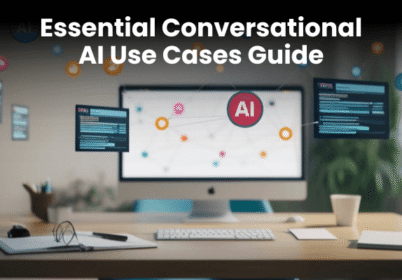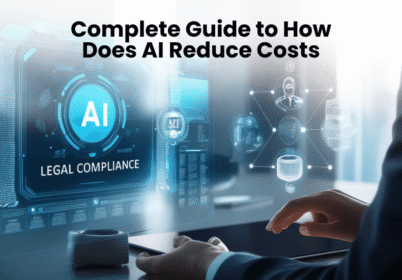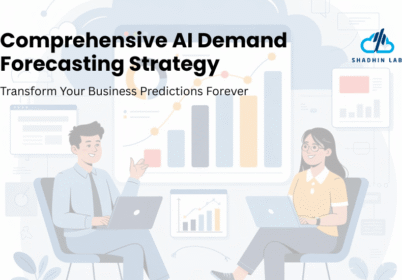Best Lovable Alternatives to Build AI-Powered Apps
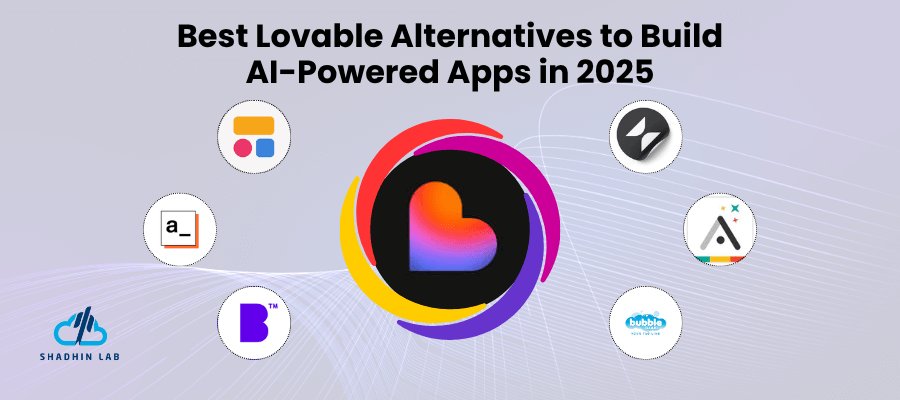
Table of Contents
Are you looking for an easier way to build web or mobile applications using artificial intelligence?
Do you know that an increasing number of founders now rely on no-code platforms to bring their ideas to life?
If yes, then you are in the right place.
Lovable AI has become one of the most talked-about tools in this space. It allows anyone to create fully functional apps using AI-generated code. You can simply describe your idea, and the platform turns it into a working app structure within minutes.
Startups, small businesses, and solo entrepreneurs love its simplicity. It removes the need for large technical teams or complex programming knowledge. With Lovable, users can create prototypes, internal tools, or even complete applications in record time.
Yet, every platform has its limits. As projects grow, many users begin to feel Lovable AI’s restrictions. Some seek deeper customization and stronger scalability. Others need richer integrations or more control over backend systems.
This article explores the best Lovable alternatives available in 2025. You will learn what makes each platform unique, what features to consider before choosing, and how to pick the one that fits your business needs.
- Readers will know the strengths and limitations of Lovable AI, discover the best alternatives available , and learn how to choose the right no-code platform for their goals.
- Understand how Lovable AI works and why users seek more flexible or scalable alternatives.
- Explore top Lovable alternatives like Bubble, Adalo, Glide, Appsmith, OutSystems, Softr, and Builder.ai.
- Compare leading platforms through features such as customization, scalability, and integration support.
- Identify which no-code or low-code tool fits best for startups, enterprises, or individual creators.
- Evaluate essential factors before switching, including pricing, AI coding quality, and long-term usability.
- Learn how Shadhin Lab can build fully customized, AI-powered applications beyond no-code limitations.
Table of Contents
What is Lovable AI?
Lovable AI is a no-code development platform powered by artificial intelligence. It helps users turn plain text instructions into complete web or mobile applications. The platform focuses on simplifying software creation for non-developers and small teams.
Users can describe what they want in natural language, and Lovable automatically generates the app structure and layout. It also includes AI-generated code that can be adjusted directly within the platform. The tool handles most of the development process, allowing faster deployment of ideas into live products.
Lovable AI supports essential development steps such as designing user interfaces, connecting to databases, and publishing finished apps. It reduces the need for manual coding and helps users save time on complex technical tasks.
The main goal of Lovable is to make app creation accessible to everyone. It bridges the gap between technical and non-technical users, empowering people to build digital solutions for their own needs. Whether for startups, internal business tools, or early product prototypes, Lovable AI simplifies app creation with an easy and guided approach.
Why Look for Lovable Alternatives?
While Lovable AI is a great starting point, it may not fit every project requirement. As users become more experienced, they often face challenges that limit creativity or scalability. These challenges lead many to search for better alternatives.
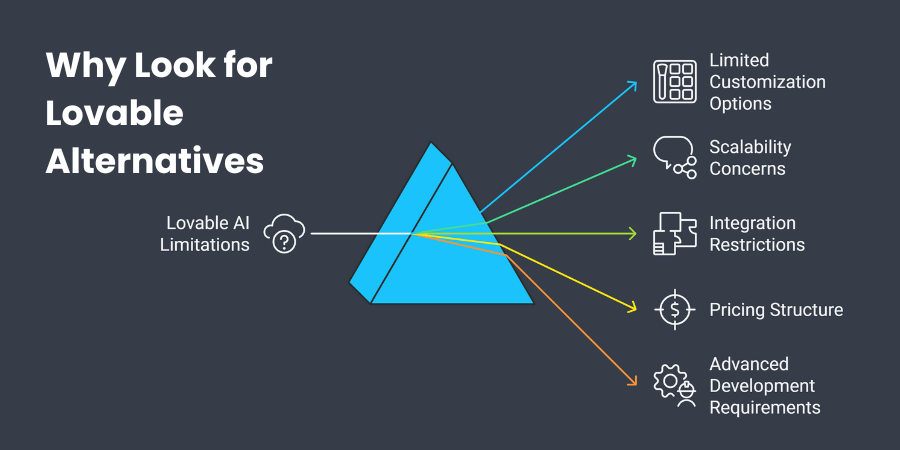
Limited customization options
Lovable AI focuses on simplicity, but this often restricts deeper customization. Users who want to design complex interfaces or integrate advanced logic find it difficult to work within its constraints.
Scalability concerns
For small projects, Lovable works well. However, as user bases grow, the platform’s scalability options become limited. Larger applications might need more control over performance, hosting, and database handling.
Integration restrictions
Modern apps often need connections to various APIs, cloud databases, or external services. Lovable supports a few basic integrations, but it may not meet the complex needs of enterprise-level applications.
Pricing structure
Some users find Lovable’s pricing less flexible as projects expand. The cost may increase rapidly with added features, larger user bases, or additional storage needs.
Advanced development requirements
Experienced developers sometimes prefer platforms that offer direct access to the codebase. Lovable’s no-code nature makes it harder to apply specific frameworks, libraries, or development tools.
For these reasons, exploring alternatives becomes essential. Different platforms offer diverse capabilities, such as better collaboration, API access, or stronger AI automation. The next sections will guide you through what to consider when selecting an alternative and which platforms perform best in 2025.
Key Features to Consider in a Lovable AI Alternative
Before you switch from Lovable AI to another platform, it is important to understand what features matter most. The right choice depends on your goals, team size, and project scope. Here are key features to look for in any alternative.
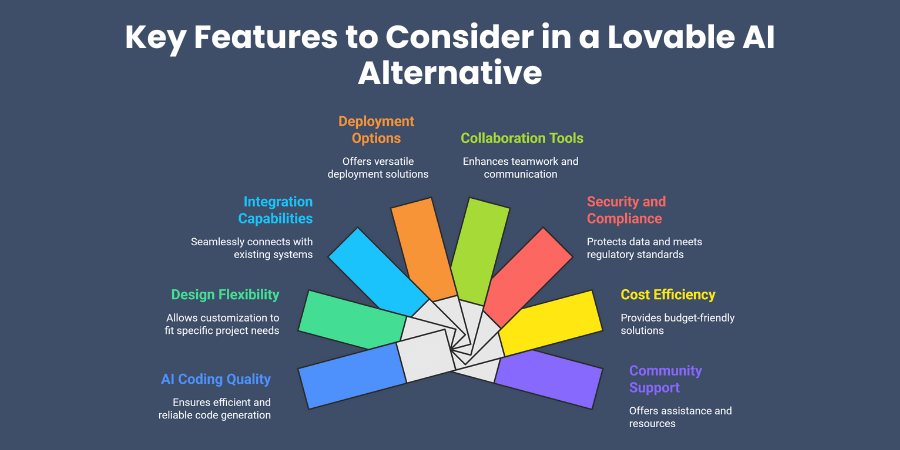
AI coding quality
AI-driven coding should generate clean, logical, and maintainable code. The platform should allow you to view, edit, and improve the AI-generated structure easily. High-quality AI output saves time and reduces the need for manual adjustments.
Flexibility in design and customization
Choose a tool that lets you design unique layouts, adjust components, and apply your brand identity. Platforms with advanced customization options provide greater creative control. They help you build applications that reflect your unique business style.
Integration with databases and APIs
Integrations are critical for most modern applications. A strong platform should easily connect to external APIs, CRMs, payment systems, and cloud storage solutions. Look for alternatives that support multiple database types and offer visual integration tools.
Deployment capabilities
App deployment should be smooth and quick. Some no-code platforms include one-click publishing features that help you launch apps instantly. Ensure your chosen platform supports both web and mobile deployments with minimal setup time.
Collaboration tools
If you work in a team, collaboration features are vital. Look for platforms that allow multiple users to edit, comment, or build together in real time. This feature improves productivity and communication across departments.
Security and compliance
Data protection must never be compromised. The alternative you choose should include role-based access controls, encryption, and compliance with privacy regulations. This ensures safe and secure app usage.
Cost efficiency
The platform should match your budget while offering value for money. Consider not only subscription costs but also scaling expenses as your application grows. Some tools provide free tiers or flexible pricing for startups and small businesses.
Community and support
Active user communities and responsive customer support can make a huge difference. Check if the platform has helpful documentation, tutorials, and a strong community forum. This support structure helps users overcome challenges more quickly.
Best Lovable Alternatives in 2025
Now that you know what to look for, let us explore the leading Lovable alternatives in 2025. Each of these tools provides unique strengths for different users, from beginners to professional developers.
1.Bubble
Bubble is one of the most popular no-code platforms in the world. It allows users to create web applications visually without writing code. The platform includes a drag-and-drop interface, robust integrations, and advanced customization features.
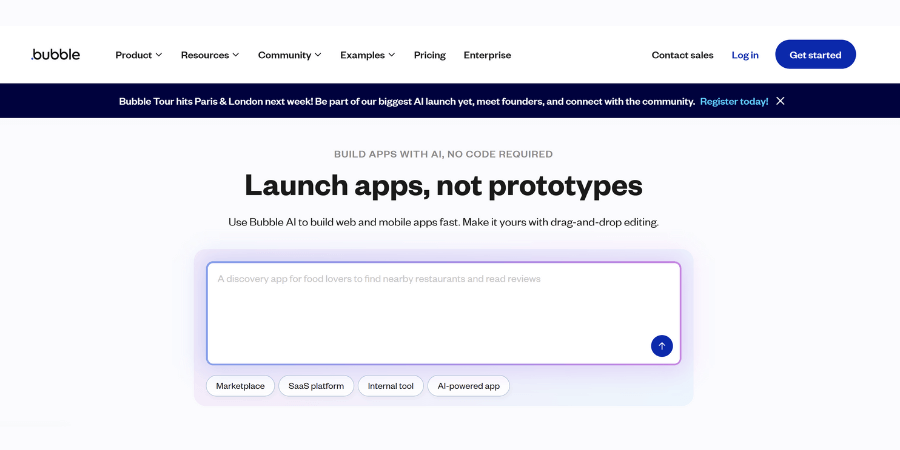
Why it stands out
Bubble provides deep control over design and functionality. Users can build highly interactive web applications and connect them with external APIs. Unlike many no-code tools, Bubble gives users access to the logic behind their apps, offering greater flexibility.
Best for
Startups, freelancers, and businesses that want to build full web applications without traditional development.
Industries served
E-commerce, education, finance, real estate, and digital marketplaces often use Bubble to prototype or build production-ready apps.
2. Adalo
Adalo focuses on mobile app creation through an intuitive visual builder. Users can design, link screens, and add logic through simple workflows. It allows instant publishing to both iOS and Android app stores.
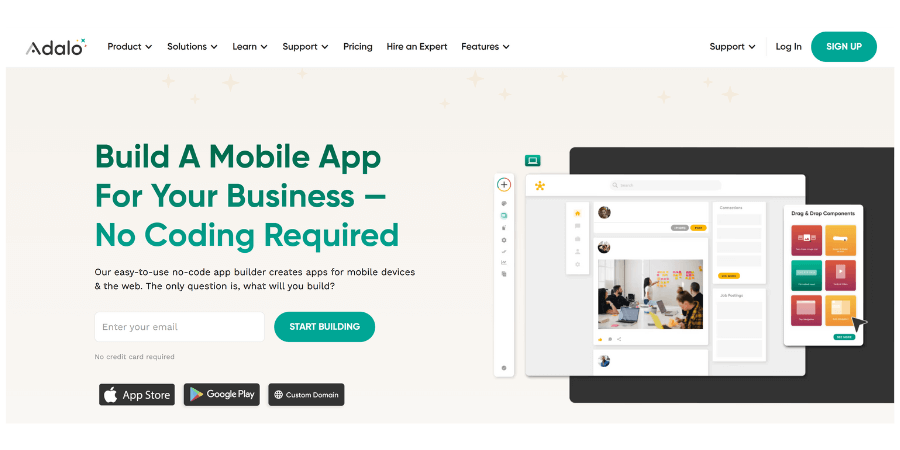
Why it stands out
Adalo is built specifically for mobile applications. It provides pre-made components, real-time database updates, and API connections. The platform also offers integrated analytics, helping users monitor app performance.
Best for
Entrepreneurs and small businesses looking to build mobile-first solutions quickly without hiring developers.
Industries served
Retail, delivery services, event management, and local service providers benefit most from Adalo’s mobile-first approach.
3. Glide
Glide transforms spreadsheets into functional apps. It is one of the simplest platforms for beginners who need a quick app solution. Users can import data from Google Sheets and design apps through a simple interface.
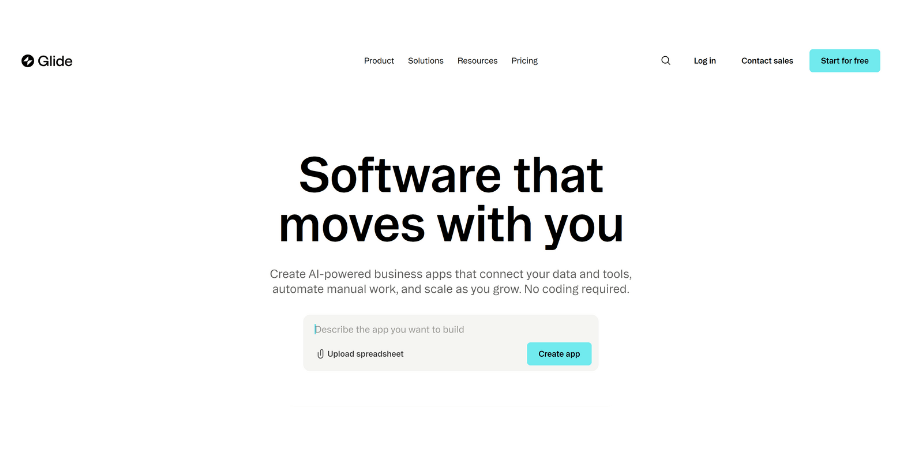
Why it stands out
Glide stands out for its simplicity and data-driven approach. It allows users to create dashboards, internal tools, and lightweight mobile apps using spreadsheet logic.
Best for
Non-technical users, educators, or teams who need quick prototypes or internal tools without complex coding.
Industries served
Education, logistics, field service management, and small business operations use Glide for fast, practical app creation.
4.Appsmith
Appsmith is an open-source platform that combines low-code flexibility with enterprise-grade functionality. It allows teams to build custom internal tools using visual components and APIs.
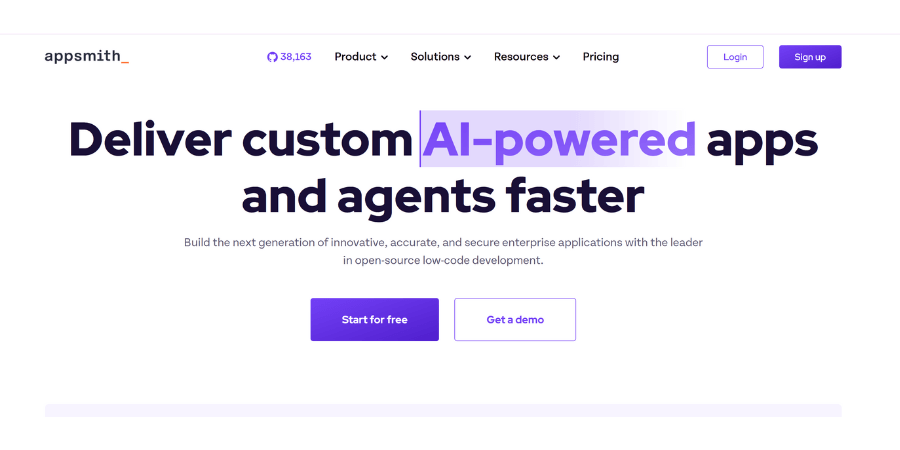
Why it stands out
Appsmith is ideal for technical teams who want more control. It supports JavaScript customization, database integration, and advanced workflows. Users can self-host or use the cloud version, which enhances flexibility and security.
Best for
Developers and data teams building internal dashboards, admin panels, or analytics tools.
Industries served
Fintech, data analytics, healthcare, and logistics sectors often rely on Appsmith to streamline internal processes.
5. OutSystems
OutSystems is a robust low-code development platform that supports both mobile and web applications. It focuses on scalability and enterprise-level solutions.
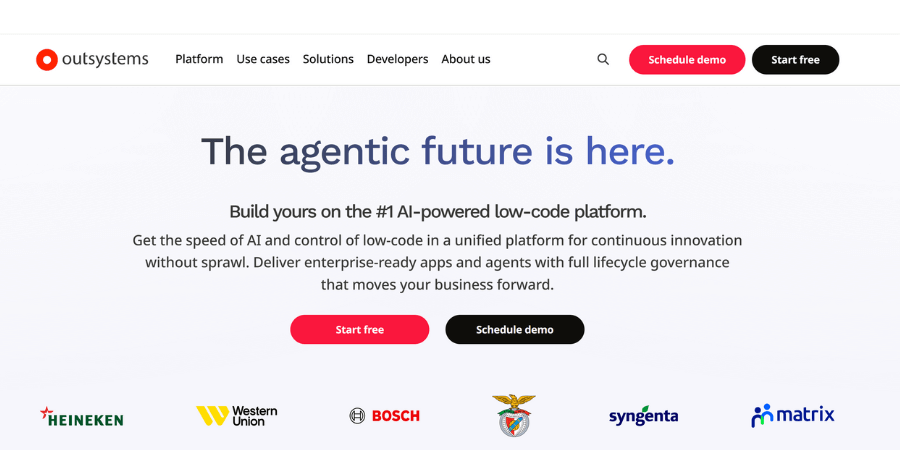
Why it stands out
OutSystems combines low-code simplicity with professional-grade capabilities. It provides advanced integration support, automated testing, and scalable cloud deployment.
Best for
Large organizations and development teams that need to build secure, high-performance applications quickly.
Industries served
Banking, insurance, government, and telecommunications industries use OutSystems for mission-critical systems and enterprise tools.
6. Softr
Softr is a no-code platform that converts Airtable or Google Sheets data into professional web applications. It offers pre-built templates, user authentication, and dynamic content management.
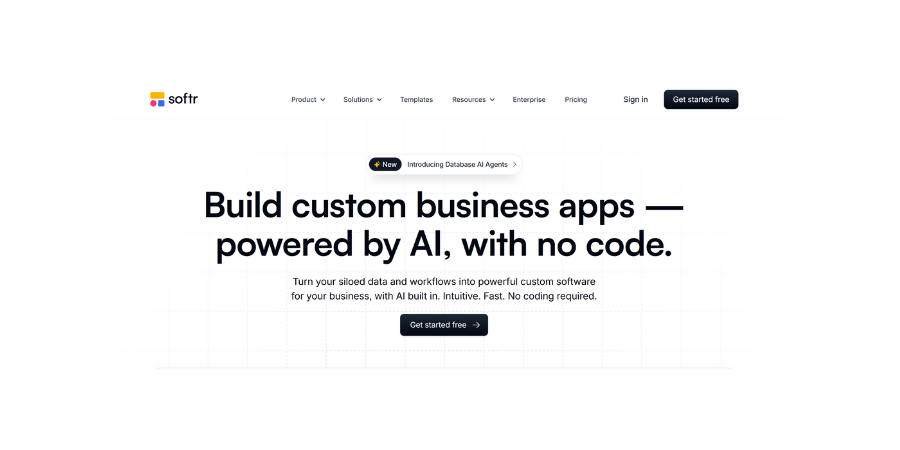
Why it stands out
Softr stands out for its simplicity and strong connection to data sources. Users can create portals, client dashboards, or membership sites using real-time data. It is flexible enough for both internal and customer-facing applications.
Best for
Businesses that already manage data in Airtable or Google Sheets and want to turn it into usable applications.
Industries served
Consulting firms, educational platforms, and service-based companies use Softr for client portals and data management systems.
7. Builder.ai
Builder.ai is an AI-powered app development platform designed for creating scalable software with minimal coding. It uses machine learning to understand project needs and generate tailored app structures.
Why it stands out
Builder.ai offers flexibility and customization. Unlike most no-code platforms, it focuses on helping users create production-ready applications with enterprise-grade quality. It handles design, development, and hosting in one place.
Best for
Companies that need advanced applications with custom features but want to reduce development time and cost.
Industries served
E-commerce, healthcare, and finance industries rely on Builder.ai for high-quality applications that scale easily.
Lovable AI vs. Alternatives: Comparison Overview
Choosing the right no-code platform depends on usability, customization, integration, and scalability. Lovable AI offers simplicity and speed, but several alternatives provide stronger control and flexibility. Understanding their differences helps users match each platform with their technical goals and business size.
Lovable AI focuses on turning text prompts into apps quickly. It is excellent for beginners but may lack deep customization. Platforms like Bubble and Appsmith deliver more flexibility, while OutSystems and Builder.ai support enterprise-grade applications. Softr and Glide emphasize simplicity and data-driven design for small teams or educators.
The table below compares these platforms based on essential factors.
| Platform | Ease of Use | Speed of App Generation | Customization | Scalability | Integration Support | Best For | Pricing Flexibility | Developer Support |
| Lovable AI | Very easy for beginners | Very fast using AI prompts | Limited | Moderate | Basic integrations | Startups, small teams | Moderate | Good, but limited to platform tools |
| Bubble | Moderate learning curve | Fast once familiar | Very high | High | Wide range of APIs and plugins | Startups, web app developers | Flexible plans | Excellent community support |
| Adalo | Simple interface | Quick for mobile apps | Moderate | Medium | Good for mobile-specific APIs | Entrepreneurs, app creators | Affordable | Active support and tutorials |
| Glide | Very easy | Instant using spreadsheets | Basic to moderate | Low to medium | Google Sheets and API-friendly | Educators, small teams | Transparent and affordable | Helpful user community |
| Appsmith | Moderate | Fast for internal tools | High | High | Excellent API and database links | Developers, data teams | Free and paid plans | Strong open-source community |
| OutSystems | Requires some expertise | Fast with low-code setup | Very high | Very high | Extensive enterprise integrations | Enterprises, large projects | Premium pricing | Dedicated professional support |
| Softr | Very easy | Fast for Airtable apps | Moderate | Medium | Airtable and Google Sheets focused | Consultants, service firms | Flexible and fair | Responsive support |
| Builder.ai | Moderate | Fast using AI templates | Very high | Very high | Broad API and third-party connections | Enterprises, tech startups | Custom pricing | Dedicated expert support |
How to Choose the Right Lovable AI Alternative
Selecting the right platform depends on your project goals, budget, and skill level. Each user type has different priorities.
For startup founders
Startups need speed, affordability, and flexibility. Platforms like Bubble and Adalo are excellent choices. They allow quick prototyping and user testing before heavy investments. Softr is also great for startups managing client data with Airtable.
For solo developers or freelancers
Freelancers need control over design and deployment. Appsmith or Bubble provide that balance. They support advanced customization and client-focused solutions. These platforms also help you create reusable templates for future projects.
For enterprises or large teams
OutSystems and Builder.ai are better suited for enterprise projects. They offer strong security, automation, and collaboration tools. Their scalability ensures smooth performance even as application traffic grows.
For educators and small teams
Glide and Softr are excellent for educational projects or internal tools. They simplify development and allow teams to build apps without technical expertise. These platforms help educators and managers organize workflows quickly.
Evaluate your needs carefully
Before deciding, outline your goals. Consider how much customization, scalability, and integration you require. Review your team’s technical skills. Test free trials to explore the interface and ensure it meets your workflow.
Budget planning
Compare not only the initial cost but also scaling expenses. Some platforms increase charges based on app users, data volume, or integrations. Choose a tool that fits your long-term financial plan.
Long-term scalability
If you plan to expand your project later, select a platform that supports migration or advanced integration. This prevents the need to rebuild your app later. Builder.ai and OutSystems are particularly reliable for growing businesses.
How Shadhin Lab Can Help You Build AI-Powered Applications
While no-code and low-code platforms are excellent starting points, custom solutions often provide the best long-term results. This is where Shadhin Lab can make a real difference.
Shadhin Lab helps businesses and individuals build AI-powered applications that match specific goals. The team focuses on understanding each client’s needs before designing the right solution. Unlike automated no-code platforms, Shadhin Lab offers human-guided development with precision and flexibility.
The company can build web or mobile applications from scratch using modern frameworks. It also integrates AI tools, APIs, and automation workflows that align with your business model. This ensures better performance and scalability.
Another advantage is ongoing support. Shadhin Lab does not stop at development. It continues to offer maintenance, feature upgrades, and optimization as your app grows. Clients receive long-term partnership instead of one-time delivery.
For businesses that have started with no-code tools like Lovable or Bubble, Shadhin Lab can help transition to custom-built systems. This allows greater control over design, security, and scalability without losing the benefits of AI-powered efficiency.
Whether you are a startup founder, an established enterprise, or a solo entrepreneur, Shadhin Lab offers the right mix of technology and expertise. Its approach ensures that your digital product performs smoothly and adapts as your needs evolve.
Conclusion
Lovable AI has earned its place as a leading no-code platform for quick app creation. It allows startups and individuals to build applications faster and with minimal effort. However, it may not meet every technical or creative requirement.
Alternatives like Bubble, Adalo, Glide, Appsmith, OutSystems, Softr, and Builder.ai offer more options in terms of customization, scalability, and pricing. Each platform serves different audiences and industries, from small startups to enterprise teams.
Choosing the right platform requires careful evaluation of your project type, long-term goals, and available resources. Some users will benefit from the speed and simplicity of Glide or Softr, while others may prefer the professional power of Builder.ai or OutSystems.
If your goal is to create an AI-powered solution that perfectly fits your business, Shadhin Lab can help. With custom-built AI integrations and expert technical support, your product can reach the next level of performance and innovation.
Lovable AI is a great start, but exploring alternatives gives you more freedom to grow, scale, and innovate beyond basic no-code limitations.
FAQs
What is Lovable AI used for?
Lovable AI helps users create web and mobile applications using AI-generated code. It simplifies app development for non-technical users.
Why should I consider a Lovable alternative?
You might need more customization, scalability, or advanced integration options. Alternatives often provide more control and flexibility.
Which is the best Lovable AI alternative for beginners?
Glide and Softr are best for beginners. They are easy to use and allow quick app creation without coding.
Which platform is better for enterprise-level projects?
Builder.ai and OutSystems are ideal for large organizations. They support complex applications, scalability, and enterprise-grade security.
Can Shadhin Lab help migrate from a no-code platform?
Yes. Shadhin Lab can help you move from no-code tools like Lovable to a fully customized, scalable application built for long-term success.
Shaif Azad
Related Post
Conversational AI Use Cases That Drive Revenue
Are you frequently considering how technology could revolutionize your business operations? Conversational AI use cases are...
How Does AI Reduce Costs? A Guide to Business Cost Optimization
Are you lying awake wondering how your business can survive rising operational costs? Have you watched...
How AI Improves Demand Forecasting Accuracy and Decision-Making
Are you tired of watching your inventory costs spiral out of control while customers walk away...

